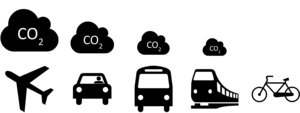How to reduce your carbon footprint

Gone are the days when we could believe that changing a light bulb or separating trash would suffice. Global warming and climate change are not only increasing, but accelerating. Now, it could be argued that ceasing to live is the ultimate way to reduce your carbon footprint. Short of that, here are the best ways to reduce your carbon footprint, in no particular order. The top ones will depend on your current lifestyle.
Fly less[edit | edit source]

While air travel represents just about 2% of global emissions,[1] that's because only 4% of the world population flies regularly (at least once per year).[2] But for those that do fly, it typically makes up more than 50% of their carbon footprint! So if you fly regularly, reducing flights is probably the top way to cut your carbon emissions.
- Give a chance to local destinations for holidays
- Favor overnight trains or buses over short distances
- Think harder whether you really need to go to that conference
- Pay extra for shorter direct flights (your time is valuable too!)
- Compensate your emissions

Drive less[edit | edit source]
Cars are convenient but also a major source of greenhouse gases, both globally and at the individual level.
- Do you drive yourself to work everyday? Consider carpooling, carsharing, public transportation or biking. Electric cars are no better if the source of the electricity is burning fossil fuels.[3]
- Do you regularly drive long distances? Consider renting a car at destination and getting there by train, long-distance bus or even plane. It's not only greener, but it could be much cheaper if you prevent any problems with your car that will require repair. In many cases it can be more convenient too, since by not driving you can sleep, read, answer emails, etc.
- Do you drive everyday nearby? Consider biking, it's not only greener but also good for your health and happiness!
- Do you live in a rural area?
Eat consciously[edit | edit source]

Not all foods are created equal! The carbon footprint of different foods on a per-food-calorie basis varies wildly..[4] Plants produce more calories on the same amount of land and emit less carbon dioxide and methane than animals. Foods with the lowest associated carbon footprints include:
- Grains, pulses, fruits and vegetables.
- Anything you grow yourself without fossil fuel inputs.
- Chicken — Not particularly low footprint but the lowest among meats.
Foods with the highest carbon footprints include:
- Red meat — Meat production requires a lot of land for growing animal feed, which is the main driver of deforestation globally.
- Dairy — Cattle also emits considerable amounts of methane.[5]
- Processed foods — Requiring refrigeration and anything air-freighted or grown in most greenhouses (except Iceland where they are heated geothermally).
Planning meals ahead of time can help avoid the temptation to purchase prepared foods and take advantage of fresh, local food that is in season.
Buy responsibly[edit | edit source]
- Buy less — Making products takes energy, so buying less products reduces your footprint. Reuse, repurpose and repair.
- Buy local — Transport takes energy, so buying local products reduces your footprint too. Growing your own food is as local as it gets (and fascinating too!).
- Buy wisely — Every product or service you buy supports the continuity of that product or service, so chose wisely the products and companies you support.
Make your home energy-efficient[edit | edit source]
- Improve insulation — Heating and cooling are the main sources of energy consumption in most homes. In winter, turn down the thermostat a few degrees and wear a sweater instead; in summer, try cooling your room with water. Invest in double-glass windows and if you're building a new house, insulate the floor and roof. Thermal curtains are a great option as you can take them with you when moving away.
- Optimize your appliances — Use grade A appliances such as LED instead of incandescent and fluorescent bulbs. Turn off unused appliances and unplug them to avoid phantom loads.
- Install solar panels — Nowadays they are cheap and easy to install. It may still take some years to recover the investment, but your carbon footprint will drop immediately.
- Build with prefabricated panels — Cement is one of the leading industries in carbon emissions. Making your house with prefabricated panels is not only greener, but also cheaper, faster and with better insulation.
Use birth-control methods[edit | edit source]
While it could be argued that your children's footprint is their responsibility, not yours, that surely applies from when they are 18 years old or more. So if you're not planning on having children, better not have them.
Re-evaluate your job[edit | edit source]
Most of us picked our profession without considering its carbon footprint, or even before we knew of such a thing. So now that you know, perhaps you should ask: does my job increase my carbon footprint, significantly?
- Bitcoin trader? Consider investing in more carbon efficient cryptocurrencies.[6]
- Tech practitioner? See Carbon footprint guide for tech practitioners
Re-evaluate your life[edit | edit source]
This guide covers many or even most things you should consider to reduce your footprint. However, every life is different so there may be crucial items missing. For example:
- Hobbies — Most have a low footprint, like music, gardening or board games. However, a few don't, like aviation or auto racing.
See also[edit | edit source]
External links[edit | edit source]
- https://www.carbonfootprint.com/ - Carbon footprint calculator and other resources. Calculators are all fine and useful, but they leave out many factors that are just too complex, variable or uncertain to quantify. Calculating the carbon footprint of your air travel or electricity bill is one thing, but what about your job, hobbies, or consumption habits? Such things can make up a large percentage of your footprint but are nearly impossible to quantify. That being said, using a calculator can be very useful to better understand your footprint and where to focus first. They also tend to include handy links to offset or compensate your footprint.
- uBlock Origin - Browser extension that blocks ads and trackers with minimum CPU usage. Every byte transferred through the Internet requires energy, so preventing unnecessary web requests is a simple way to reduce your footprint. uBlock Origin seems the most efficient.
References[edit | edit source]
- ↑ https://www.atag.org/facts-figures.html
- ↑ https://www.sciencedirect.com/science/article/pii/S0959378020307779
- ↑ That's not to say we shouldn't favor electric cars over a fossil-fuel ones, but transitioning to a greener transportation industry requires both electric vehicles and greener sources of electricity.
- ↑ "The Impacts - 2011 Meat Eater's Guide to Climate Change + Health". Environmental Working Group. 2011. "Lamb, beef and cheese have the highest emissions. This is true, in part, because they come from ruminant animals that constantly generate methane through their digestive process, called enteric fermentation. Methane (CH4) – a greenhouse gas 25 times more (CH4) potent than carbon dioxide (CO2), accounts for nearly half the emissions generated in this study's Nebraska beef production model (...). Pound for pound, ruminants also require significantly more energy-intensive feed and generate more manure than pork or chicken (...)."
- ↑ https://pubmed.ncbi.nlm.nih.gov/8567486/
- ↑ https://digiconomist.net/bitcoin-energy-consumption